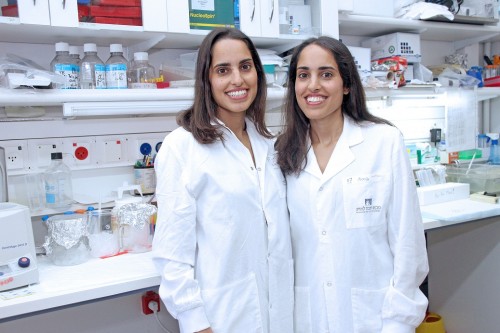One of the twins - Efrat Shema-Yacoubi also won the UNESCO-L'Oreal Prize for Women in Science. The two will go together for a post-doctorate in Boston.

Photographer: Niv Kantor
Dr. Reot Shema-Tirosh and Dr. Efrat Shema-Yacobi (31), twin sisters, PhDs in biology at the Weizmann Institute of Science, won the prestigious Fulbright scholarship for postdoctoral research in the USA. According to them, the decision to do a post-doctorate in the USA is a natural path for advancing their careers in Israel.
Reut, who was accepted to the Broad Institute, a research center of MIT and Harvard, as well as to the Picower Institute for Learning and Memory at MIT, plans to focus her research on the aging process and neurodegenerative diseases. Efrat, who was admitted to the Massachusetts Hospital, which is part of Harvard Medical School, will focus her research on epigenetic changes that occur in cancerous transformation processes and in the differentiation of embryonic stem cells.
According to Dr. Reot Shema-Tirosh, scientific research in Boston, the city with the largest scientific community in the world and the largest number of academic institutions in the world, opens up possibilities for collaborations at the global level. "The characteristics of the city and the funding options for research offered in Boston make it possible to think big and promote sophisticated and expensive research."
Dr. Efrat Shema-Yakobi adds that their type of work combined with being young mothers requires involvement, thinking, analytical skills, creativity and ambition. According to her, Israeli female researchers must go for a post-doctorate in one of the most respected science centers in the world in order to advance their careers. "To the credit of the Weizmann Institute of Science, it can be said that there are approximately the same percentage of women and men who have completed a doctorate and the institute encourages women to go on post-doctoral studies abroad through scholarships."
"It is very important to support postdoctoral students who go to study abroad, especially in their first year," says Dr. Reot Shema-Tirosh. "The Fulbright scholarship is essential for the development of science in Israel and exposure to research in the USA. Fulbright allows post-docs to be exposed to the pinnacle of the scientific community on the one hand and helps them and their families cope financially with the move to the US on the other hand."
Reut and Efrat point out that they have a special relationship and are expected to live next door in Boston, even though their research labs are located in different parts of the city. The two are expected to leave with their families, 2 daughters and Efrat a son, at the beginning of July and stay in the USA for 3 years in order to advance their research. According to them, returning home to Israel is clear and they do not see themselves living in the US, but in Israel near their family and promoting science in Israel.
In the coming academic year, 17 Israeli post-docs are expected to go to the US, with scholarships totaling approximately NIS 2.5 million, on behalf of Fulbright - which is the first intergovernmental program launched to promote scientific ties between Israel and the US. The Fulbright program extended to Israeli postdocs is made possible thanks to special support granted by the Planning and Budgeting Committee of the Council for Higher Education.
Israel's participation in the Fulbright program is managed by the US-Israel Education Foundation. Since the establishment of the United States-Israel Education Fund in 1956, about 1600 Israelis have won Fulbright scholarships for studies, further training and research in the USA, and about 1200 lecturers, post-doctoral researchers and American students have won Fulbright grants for professional visits to Israel. The Fulbright program left its mark on academic research in Israel and in other key areas.
Dr. Efrat Shema-Yacubi - winner of the UNESCO-L'Oreal Prize for Women in Science in 2012
Efrat Shema-Yakovi is a researcher at the Weizmann Institute of Science in the field of molecular biology and cancer research, in the laboratory of Prof. Moshe Oren, 31 years old, married and a mother of a child, lives in Rehovot
The proteins in the service of the fight against cancer
Efrat investigates the epigenetic changes associated with cancer. Epigenetics is the field of biology that deals with shaping the expressions of certain genes, the weakening and/or strengthening of others, etc. The DNA in our cells is wrapped around proteins called histones to form a structure called chromatin. The chromatin controls the execution of the genetic program, and influences the identity of the genes that will be expressed in each specific cell of our body. In addition, the chromatin affects processes of DNA repair and replication.
The histone proteins that make up the chromatin undergo changes ("modifications"), and these criticize the resulting chromatin structure and, as a result, the gene expression program. Efrat researches in Prof. Moshe Oren's laboratory cultures of breast cancer, lung cancer, colon cancer and more. In these cultures, she tests the roles of one of these changes. During her research, she discovered that a decrease in this change leads cells to a path of cancerous transformation: excessive divisions, migration (similar to cancer cells in the body that form metastases) and so on.
Efrat will soon move to Dr. Bradley Bernstein's lab at Harvard University in Boston, where she will continue her research on epigenetics, histone modifications and cancer. Efrat plans to develop a macroscopy method that will allow examination of the modifications on histones at a very high resolution, and will allow the assessment of the contribution of epigenetic changes to the processes of embryonic development and cancerous transformation processes.

3 תגובות
Great pride, expands the heart to know (-:
Well done, cannons, proud of you